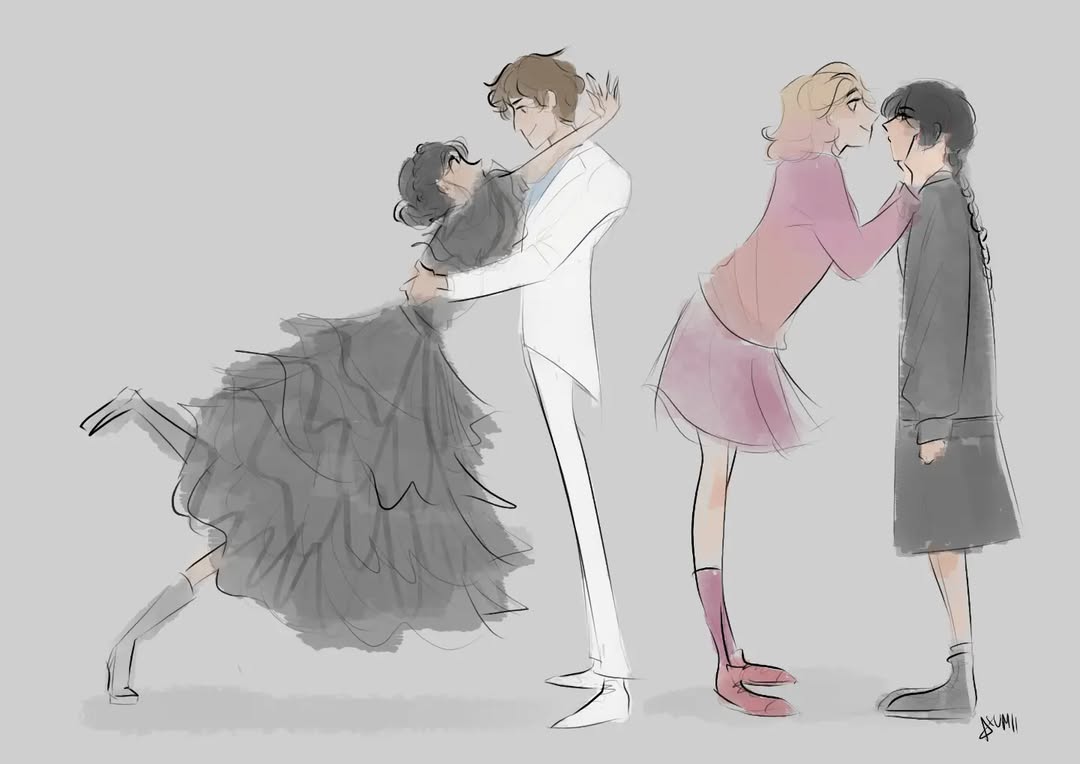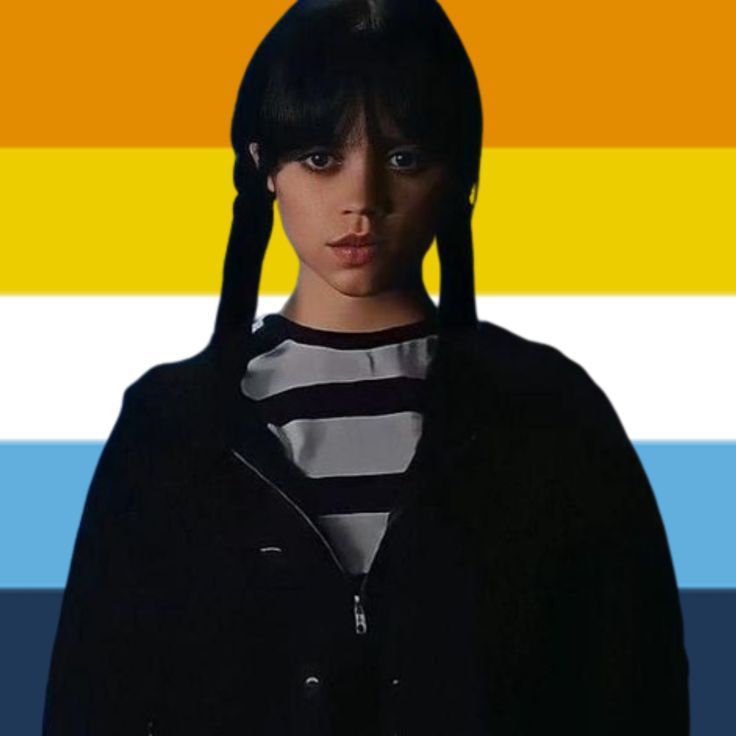By: u/AipomSilver00
Rewatching the Wednesday series once again, this thought came to mind, or rather a flow of thoughts xd.
It's no secret that the romantic side of the series has been heavily criticized, in particular the triangle is practically hated by everyone.
Here that same triangle that was shown in the series is harmful in my opinion, the result of a widespread trend in young adult fiction, where the female protagonist is constructed not as an autonomous subject, but as an object of desire.
Sometimes this takes the most direct and stereotypical form, precisely the love triangle.
Apparently it is a romantic expedient, but in practice it is often a narrative and symbolic cage, a way in which the authors end up subordinating the inner growth of a certain girl protagonist to the sentimental validation of two men who compete for her, and this is not only tiring to read and watch: it is also deeply misogynistic.
Wednesday, which on paper had all the potential to offer an alternative figure, instead shows — almost by automatic reflex — that it too ended up trapped in the most abused formula of romantic narrative.
The Xavier–Tyler–Wednesday triangle, a structure that not only does not serve the plot, but that undermines the integrity of the character of Wednesday itself.
And Wednesday is not alone in this discomfort.
These same dynamics (which go from the questionable to the most rotten toxic) are repeated in Twilight, where Bella Swan is fought over by Edward and Jacob.
The faces change, but the mechanism is always the same: the girl is worth as much as two men desire her.
The Netflix series presents us with a charismatic Wednesday Addams, emotionally reserved, independent, with a strong identity and not oriented towards pleasing others.
But then, during the season, she is dragged into a relationship with Tyler, a character who, from the first scenes, shows strange behaviors, red flags in fact: he is intrusive, manipulative, reticent.
The viewer is led to "ship" them even though it is clear that Wednesday does not really reciprocate completely.
The kiss between them is devoid of emotional tension, and seems to serve more to create a narrative shock ("Oh no, Tyler is the hyde!") than to develop an authentic bond.
In fact, there is very little authenticity when both Tyler and Thing himself forced the relationship.
(There's also the whole issue of Tyler never really wanting to help Wednesday when he was being himself, but just trying to distract her, season 2 has a lot of answers to give us on that.)
The problem is that the series plays on ambiguity for a long time, romanticising attitudes that in other contexts would (rightly) be considered red flags.
Oh and remember, just because Wednesday is weird, it doesn't mean that the suitor has the right to behave with actions bordering on the red flag.
The viewer is almost tempted to think that maybe there is something good in Tyler, that Wednesday should let herself go, that she is just “resisting” her feelings.
It's the same old story dressed up as something new: love creeping in, even when you don't want it.
And if you say no, it's because you're “afraid” to love.
The truth?
No, she just doesn't want to and that's okay.
Wednesday had every right to refuse Tyler's advances
[or even to go to Rave'n with him in general, Tyler could imagine that the letter sent by Thing was not written by Wednesday and when he shows up at the door of the room, he understands that in fact it is so, but he stays there, he does not change his mind because he wants to insist, in that context the series tells us that it is Wednesday who is in the wrong and refuses the boy's courtship]
Then there is Xavier, presented as the "healthier" alternative, but who turns out to be another problematic archetype: a mix between the "nice guy" and the weird "guy" who, despite the refusals, continues to insist.
The final episode, with the scene of the phone given to the protagonist in the finale is emblematic: Wednesday has repeatedly declared that she doesn't want it, yet Xavier still imposes his presence on her, his number already saved, as if to say: "You like me, so you should change."
But it’s anything but neutral, Wednesday, up until that point, has clearly said that she doesn’t want a phone, Xavier forces it on her anyway, an implicit invitation to change, to “stay in touch,” to not forget him.
It seems kind, but in reality it’s a form of pressure disguised as a gift.
A gesture that, if you turn it around, becomes: “I know you don’t want this, but I’ll give it to you anyway, because I want you to change your mind.”
Like Tyler, Xavier also thinks that if he persists, maybe he can get his "payment" back.
Both boys, in different ways, try to bend Wednesday to a sentimental norm that doesn't belong to her.
The problem, therefore, is not only the triangle itself, but the idea that such a nonconformist girl must still "redeem" herself through extremely bland heterosexual love.
Or worse: being used as an accessory in the growth of others, while her identity is watered down.
In fact, the similarities with Twilight can be found.
In Meyer's work, the love conflict between Bella, Edward and Jacob is not configured as a simple choice between two loves, but as a field of tensions in which the protagonist's identity and autonomy are progressively eroded.
Bella becomes more and more passive.
Edward represents the archetype of the absolute partner: mysterious, idealized, morally tormented and possessive.
Jacob, on the other hand, embodies the earthly protector, the alternative refuge that nevertheless never ceases to constitute an instrumentalized counterpart in the narration of "true love" between Bella and Edward.
Both males act on Bella not only as a loving subject, but also as an object to be contested, protected or reclaimed.
The protagonist often appears devoid of agency, suspended between two poles that define her by opposition.
Particularly revealing is the narrative arc of New Moon, where Edward's absence leads Bella to a state of extreme depression, visually represented in the film by months that pass in front of the window while she remains immobile.
Her identity appears fragile and incomplete without the presence of the other, suggesting a model of love that is not based on the encounter between two autonomous subjects, but on fusion and emotional dependence.
Edward himself, although presented as a positive figure, exercises constant control over Bella: he follows her, observes her, decides when to move away "for her own good", and returns with the expectation of being welcomed unconditionally.
This behavior, far from representing a mature love, reflects characteristics of manipulative and symbiotic relationships.
The heart of the toxicity of the triangle in both works lies in the fact that the female protagonist, rather than being an active subject who explores her own desires, becomes the target of male projections.
In Wednesday, as in Twilight, the love triangle functions not as a space of choice, but as a tension between two male models that try to “define” the protagonist, where the woman must follow one of the two to show that she is someone: the boy with a troubled past, even becoming a murderer (Tyler) and the one who protects her but expects something in return (Xavier who has a lot in common with Jacob).
In both cases, the girl's identity bends to the narrative function of the love triangle: the construction of her personality is slowed down, interrupted or subordinated to emotional dynamics.
And this is particularly problematic in Wednesday, because the character, as it has been historically conceived, represents total independence from traditional romantic and affective norms, making her “give in” to this type of love interest, even partially, contradicts her nature and sends the message that no girl, not even the strongest, can truly exist outside of male desire.
I won't lie though, in Twilight the situation is obviously much worse, but even in the Netflix series the triangle issue is rendered a bit badly and is also degrading towards Wednesday.
Without this love triangle, the Wednesday series would have had a more linear narrative, more cohesive, more faithful to its own tone.
It could have explored the themes of identity, friendship, trauma and diversity in greater depth.
Enid would not have had the rushed subplot involving her mother, Tyler could have had more space to prove himself an interesting character (instead, he shows potential outside the love triangle and is more interesting in his drama with his father and his Hyde nature), the ending would not have been anticlimactic and rushed, etc.
Even Xavier could have been an interesting character, but instead, because of the love triangle, his only function is to be a red flag about who Hyde might be.
Let me be clear, if you appreciate these ships you are not problematic in and of yourself, I simply wanted to write a thought on the most criticized element of the series and luckily Jenna pushed to remove both the triangle and the romantic element.



















